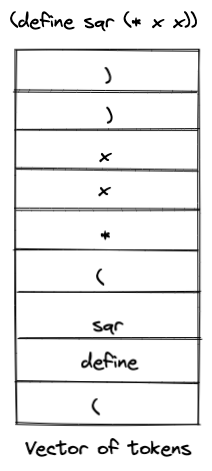Lexer
Source
Code Walk Through
Lexer is a component of the interpreter that takes the program text and converts it to a stream of atomic units known as tokens. Every token has a type and may even have a value associated with it. In the case of our interpreter, there are four types of tokens. The four tokens can be represented using a Rust enum as follows.
pub enum Token {
Integer(i64),
Symbol(String),
LParen,
RParen,
}
- Integer: A signed 64-bit integer
- Symbol: Any group of characters other than an integer or parenthesis
- LParen: Left parenthesis
- RParen: Right parenthesis
The first step in implementing a lexer is to replace the parenthesis with an extra space before and after it. For example,
(define sqr (* x x))
will get converted to
( define sqr ( * x x ) )
With this simple trick, the process of tokenization involves splitting the Lisp program with whitespace.
let program2 = program.replace("(", " ( ")
.replace(")", " ) ");
let words = program2.split_whitespace();
Once the words for the program are obtained, they can be converted into tokens using Rust's pattern matching as follows
let mut tokens: Vec<Token> = Vec::new();
for word in words {
match word {
"(" => tokens.push(Token::LParen),
")" => tokens.push(Token::RParen),
_ => {
let i = word.parse::<i64>();
if i.is_ok() {
tokens.push(Token::Integer(
i.unwrap()));
} else {
tokens.push(Token::Symbol(
word.to_string()));
}
}
}
}
At this point, we have a vector of tokens for the entire Lisp program. Note that a vector in Rust is a stack, hence the tokens are stored in the vector in the reverse order as shown below with an example.

Testing
The lexer code can be unit tested as shown below
let tokens = tokenize("(+ 1 2)");
assert_eq!(
tokens,
vec![
Token::LParen,
Token::Symbol("+".to_string()),
Token::Integer(1),
Token::Integer(2),
Token::RParen,
]
);
To cement your understanding of the Lexing process please go through the remaining tests in lexer.rs